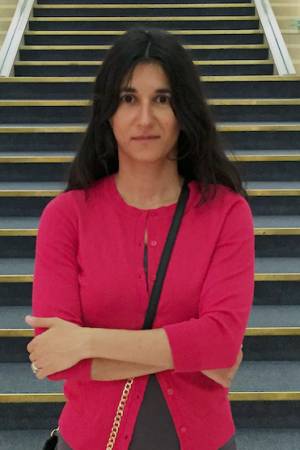Calendar of Events
S Sun
M Mon
T Tue
W Wed
T Thu
F Fri
S Sat
0 events,
0 events,
0 events,
0 events,
2 events,
Special Events
Katerina Fragkiadaki
Machine Learning Department, Carnegie Mellon University.
Teruko Yata Memorial Lecture in Robotics
Title: Learning World Simulators from Data Abstract: Modern foundational models have achieved superhuman performance in many logic and mathematical reasoning tasks by learning to think step by step. However, their ability to understand videos, and, consequently, control embodied agents, lags behind. They often make mistakes in recognizing simple activities, and often hallucinate when generating videos. This […]
PhD Speaking Qualifier
Willa Potosnak
Investigating Compositional Reasoning in Time Series Foundation Models
Abstract: Large pre-trained time series foundation models (TSFMs) have demonstrated promising zero-shot performance across a wide range of domains. However, a question remains: Do TSFMs succeed solely by memorizing training patterns, or do they possess the ability to reason? While reasoning is a topic of great interest in the study of Large Language Models (LLMs), […]
5 events,
MSR Thesis Defense
Ryan Aponte
Learning from Animal and Human Videos
Abstract: Animals and humans can learn from the billions of years of life on Earth and the evoluNon that has shaped it. If robots can borrow from that wealth of experience, they too could be enabled to learn from the experience, instead of learning through brute force trial-and-error. Learning from internet-scale videos, such as the […]
PhD Speaking Qualifier
Hanzhe Hu
Learning Efficient 3D Generation
Abstract: Recent advances in 3D generation have enabled the synthesis of multi-view images using large-scale pre-trained 2D diffusion models. However, these methods typically require dozens of forward passes, resulting in significant computational overhead. In this talk, we introduce Turbo3D, an ultra-fast text-to-3D system that generates high-quality Gaussian Splatting assets in under one second. Turbo3D features a […]
Special Events
2025 National Robotics Week Robotics Institute Open House
2025 National Robotics Week Robotics Institute Open House
12:00 - 4:00 pm: PUBLIC SPACE ROBOTS Open to the public TANK the roboceptionist Newell-Simon Hall 3rd floor entry area Meet Marion (Tank) LeFleur, Newell-Simon’s Roboceptionist. He’ll be glad to see you! The goal of the project is to produce a robot helpmate that is useful, exhibits social competence, and remains compelling to interact with for […]
MSR Thesis Defense
Xinyu Wang
Reconstructing Tree Skeletons in Agricultural Robotics: A Comparative Study of Single-View and Volumetric Methods
Abstract: This thesis investigates the problem of reconstructing tree skeletons for agricultural robotics, comparing single-view image-based (Image to 3D) and volumetric (3D to 3D) methods. Accurate 3D modeling is essential for robotic tasks like pruning and harvesting, where understanding the underlying branch structure is critical. Using a custom-generated dataset of synthetic trees, we train encoder-decoder […]
MSR Thesis Defense
Tianxiang Lin
Acoustic Neural 3D Reconstruction Under Pose Drift
Abstract: We consider the problem of optimizing neural implicit surfaces for 3D reconstruction using acoustic images collected with drifting sensor poses. The accuracy of current state-of-the-art 3D acoustic modeling algorithms is highly dependent on accurate pose estimation; small errors in sensor pose can lead to severe reconstruction artifacts. In this paper, we propose an algorithm […]
0 events,
0 events,
3 events,
PhD Speaking Qualifier
Yilin Wu
Open-World Policy Steering for Robot Manipulation
Abstract: Generative robot policies have shown remarkable potential in learning complex, multimodal behaviors from demonstrations. However, at runtime, they still exhibit diverse failures ranging from task incompletion (e.g., toppling or dropping objects) to misaligned behaviors (e.g., placing the gripper inside of a cup of water). Instead of constantly re-training the policies with new data, we […]
Faculty Candidate
Karl Pertsch
UC Berkeley and Stanford
Faculty Candidate Talk: Karl Pertsch
Talk Title: Unlocking Scalable Robot Learning in the Real World Abstract: Many domains of machine learning, from language modeling to computer vision, have recently undergone a shift towards generalist models, whose broad generalization abilities are fueled by large and diverse real-world training datasets and high-capacity model architectures. In robotics, however, it has been challenging to […]
PhD Thesis Defense
Benjamin Eisner
Deep 3D Geometric Reasoning for Robot Manipulation
Abstract: To solve general manipulation tasks in real-world environments, robots must be able to perceive and condition their manipulation policies on the 3D world. These agents will need to understand various common-sense spatial/geometric concepts about manipulation tasks: that local geometry can suggest potential manipulation strategies; that changes in observation viewpoint shouldn't affect the interpretation of […]
2 events,
Faculty Candidate
Aja Carter
Mechanical Engineering, Carnegie Mellon University
Faculty Candidate Talk: Aja Carter
Title: Paleorobotics: Design Principles 540 million years in the making Abstract: Bioinspiration has provided key design insights in many fields, particularly in robotics, where there has been an explosion of interest in quadrupedal robot “dogs” and bipedal humanoid robots. However, the designs prescribed by only considering living animals are a small subset of available designs; […]
PhD Thesis Proposal
Uksang Yoo
Deformation-Aware Manipulation: Compliant and Geometric Approaches for Non-Anthropomorphic Hands
Abstract: Soft robot hands offer compelling advantages for manipulation tasks, including inherent safety through material compliance, robust adaptation to uncertain object geometries, and the ability to conform to complex shapes passively. However, these same properties create significant challenges for conventional sensing and control approaches. This talk presents approaches to bridging advances in geometric learning and […]
1 event,
Faculty Candidate
Carmelo (Carlo) Sferrazza
UC Berkeley
Faculty Candidate Talk: Carlo Sferrazza
Title: The Path to Humanoid Intelligence Abstract: Humanoid robots represent the ideal physical embodiment to assist us in the diversity of our daily tasks and human-centric environments. Driven by substantial hardware advancements, progress in artificial intelligence (AI), and a growing demand for adaptable automation, this vision appears increasingly feasible. Yet, to date, humanoid intelligence remains […]
1 event,
MSR Thesis Defense
Vihaan Misra
Towards Natural Language-Driven Shape Arrangement Synthesis using Semantically-Aware Geometric Constraints
Abstract: While diffusion-based models excel at generating photorealistic images from text, a more nuanced challenge emerges when constrained to using only a fixed set of rigid shapes—akin to solving tangram puzzles or arranging real-world objects to match semantic descriptions. We formalize this problem as shape-based image generation, a new natural language-guided image-to-image translation task that […]
3 events,
PhD Thesis Proposal
Ingrid Navarro
Toward Generalizable Interaction-aware Human Motion Prediction
Abstract: As autonomous robots are increasingly expected to operate in dynamic, human-centered environments, it is crucial to develop robot policies that ensure safe and seamless interactions with humans, all while allowing robots to complete their intended tasks efficiently. To achieve this, robots must be capable of making informed decisions that account for human preferences, ensuring […]
RI Seminar
Sangbae Kim
Mechanical Engineering, Massachusetts Institute of Technology
Physical Intelligence and Cognitive Biases Toward AI
Abstract: When will robots be able to clean my house, dishes, and take care of laundry? While we source labor primarily from automated machines in factories, the penetration of physical robots in our daily lives has been slow. What are the challenges in realizing these intelligent machines capable of human level skill? Isn’t AI advanced […]
Special Events
Robotics Institute Semi-formal
Robotics Institute Semi-formal
Hello all Robotics Institute faculty, students, visitors and staff, You and a guest are cordially invited to attend The Robotics Institute Semi-formal
0 events,
0 events,
4 events,
MSR Thesis Defense
Muhan Lin
Enhancing Reinforcement Learning with Error-Prone Language Models
The correct specification of reward models is a well-known challenge in reinforcement learning. Hand-crafted reward functions, which are usually sparse, often lead to inefficient or suboptimal policies, misalignment with user values, or difficulties in attributing credit or blame within multi-agent systems. Reinforcement learning from human feedback is a successful technique that can mitigate such issues […]
PhD Thesis Proposal
Rishi Veerapaneni
Efficient Multi-Agent Motion Planning using Local Policies
Abstract: Teams of multiple robots working together can achieve challenging tasks like warehouse automation, search and rescue, and cooperative construction. However, finding efficient collision-free motions for all agents is extremely challenging as the complexity of the multi-agent motion planning (MAMP) problem grows exponentially with the number of agents. Multi-Agent Path Finding (MAPF) is a subset […]
MSR Thesis Defense
Wenli Xiao
Foundation Control Model for General Embodied Intelligence
Abstract: With the growing accessibility of humanoid hardware and rapid advances in foundation models, we are entering an era where achieving general embodied intelligence is within reach—enabling humanoid robots to perform a wide range of tasks in human-centric environments. Despite significant progress in language and vision foundation models, controlling humanoids with high degrees of freedom […]
MSR Thesis Defense
Tairan He
Learning Humanoid Robots from Simulation to Real to Simulation
Abstract: How do we teach humanoid robots to move like humans—and do so reliably in the real world? In this talk, I’ll share my journey in building a learning-based pipeline that closes the loop between simulation and reality for humanoid whole-body control. Starting from real-time teleoperation (H2O), to scalable data humanoid collection (OmniH2O), to learning […]
3 events,
Faculty Candidate
Jason Ma
University of Pennsylvania
Faculty Candidate Talk: Jason Ma
Title: Internet Supervision for Robot Learning Abstract: The availability of internet-scale data has led to impressive large-scale AI models in various domains, such as vision and language. For learning robot skills, despite recent efforts in crowd-sourcing robot data, robot-specific datasets remain orders of magnitude smaller. Rather than focusing on scaling robot data, my research takes the alternative path of directly […]
MSR Thesis Defense
Shuyang Shi
Experience-Based Action Advising for Multi-Agent Teaming
Abstract: We study how to improve coordination efficiency for multi-agent teams with heterogeneously experienced agents. In such a setting, experienced agents can transfer their knowledge to less experienced agents to accelerate their learning, while leveraging the students' initial expertise to inform what knowledge to transfer. Inspired by this idea, this work specifically assumes one teacher […]
MSR Thesis Defense
Yanbo Xu
Towards Controllable Sampling and Diverse Score Distillation in Diffusion Models
Abstract: Denoising diffusion models have emerged as a powerful paradigm for generative modeling, which has been widely used for perception, generation, and action. These models can be utilized through sampling or score distillation; however, existing methods lack controllability in sampling and suffer from limited diversity in score distillation. In this thesis, we propose two complementary mechanisms to enhance the […]
1 event,
MSR Thesis Defense
Sidney Nimako-Boateng
RESCUE Rollers: A Platform for Collaborative, Multi-robot Exploration in Search and Rescue
Abstract: The use of robotic platforms for search and rescue remains a significant challenge for many roboticist. While human and animal first responders play critical roles, their effectiveness can be limited by biological constraints. Robotic systems offer the potential to overcome these limitations, especially in environments inaccessible to humans and animals due to size or […]
3 events,
PhD Thesis Proposal
Yufei Wang
Scaling, Automating and Adapting Sim-to-real Policy Learning
Abstract: Building a generalist robot capable of performing diverse tasks in unstructured environments remains a longstanding challenge. A recent trend in robot learning aims to address this by scaling up demonstration datasets for imitation learning. However, most large-scale robotics datasets are collected in the real-world, often via manual teleoperation. This process is labor-intensive, slow, hardware-dependent, [...]
MSR Thesis Defense
Yuanhao Wang
Generative 3D Garment Modeling with Sparse Visual Cues
Abstract: As digital apparel becomes increasingly vital to virtual environments and personalized experiences, there is a growing need for intuitive tools that enable non-experts to create and interact with 3D garments. To broaden accessibility, these tools must function effectively with minimal input - raising the key question: How can we achieve high-quality 3D garment modeling [...]
PhD Thesis Defense
Mononito Goswami
Towards Pragmatic Time Series Intelligence
Abstract: This thesis aims to democratize time series intelligence by making advanced modeling capabilities accessible to users without specialized machine learning knowledge. We pursue this goal through three complementary contributions that build foundation models, improve our understanding of them, and address challenges emerging in their practical use. We start by introducing MOMENT, the first family [...]
6 events,
RI Event
Tianyi Zhang
Underwater 3D Visual Perception and Generation
Abstract: With modern robotic technologies, seafloor imagery has become more accessible to researchers and the public. This thesis leverages deep learning and 3D vision techniques to deliver valuable information from seafloor image observations collected by robotic platforms. Despite the widespread use of deep learning and 3D vision algorithms across various fields, underwater imaging presents unique [...]
MSR Thesis Defense
Samuel Li
3D Understanding for Zero-Shot Task-Oriented Grasping via Grounding Symbolic Representations
Abstract: Task-oriented grasping requires robots to reason not only about object geometry, but also about the function and semantics of object parts in context. While large language models (LLMs) offer powerful commonsense knowledge, they lack grounding in physical geometry. This talk explores how symbolic object representations can bridge that gap, enabling LLMs to guide grasp [...]
Faculty Events
Ji Zhang
Autonomous Exploration and Navigation, Full Autonomy System, and Beyond
Abstract: In this talk, I will present work on autonomous exploration and introduce our full autonomy system. The work started several years ago from lidar-based state estimation. Building upon the state estimation module, the autonomy system now contains multiple fundamental modules, e.g. collision avoidance, terrain traversability analysis, and waypoint following. At the high level of [...]
MSR Thesis Defense
Silong Yong
Towards Efficient and Accurate Neural Geometry and Appearance Representations
Abstract: Neural scene representations have transformed the way we model and understand the visual world, enabling stunningly realistic reconstructions from image data. However, these advances often come at a significant computational cost, particularly due to the inefficiencies in volume rendering. In this talk, I’ll present GL-NeRF, a new approach that tackles this challenge from a [...]
RI Seminar
Charlie Kemp
Hello Robot Inc.
Human-Scale Mobile Manipulators for Meaningful In-Home Assistance
Abstract: When I started in robotics, my goal was to help robots emulate humans. Yet as my lab worked with people with mobility impairments, my notions of success changed. For assistive applications, emulation of humans is less important than ease of use and usefulness. Helping with seemingly simple tasks, such as scratching an itch or [...]
0 events,
0 events,
4 events,
MSR Thesis Defense
Yunchao Yao
Robotic Manipulation and Dense Tracking for Complex and Deformable Object Dynamics
Abstract: Many everyday human actions—like adjusting the grip on a tool or folding clothes—require the ability to handle complex dynamics involving shifting contact, deformability, or high-speed motion. While easy for humans, object manipulation with complex dynamics or rapidly changing contact conditions presents significant challenges for robots. Enabling robots to perform complex dynamic manipulations would greatly [...]
PhD Speaking Qualifier
Xinyu Li
Federated Fine-tuning of Foundation Models under Task and Model Heterogeneity
Abstract: Fine-tuning is crucial for adapting pretrained foundation models (FMs) to specific downstream tasks. When datasets are distributed across multiple clients due to privacy concerns, federated learning (FL) enables collaborative fine-tuning of FMs without requiring data sharing. In this talk, I will present our ongoing work addressing two key challenges in federated fine-tuning of FMs: […]
PhD Thesis Proposal
Moonyoung Lee
Multimodal Robot Learning for Contact-Rich Manipulation
Abstract: Robots operating in the real world can leverage intentional contacts with objects to understand and manipulate them effectively—especially in cluttered, partially observable environments where vision alone is insufficient. This thesis explores how intentional physical interactions, combined with haptic sensing, can provide rich spatial, temporal, and physical cues that enhance a robot’s perception and decision-making. […]
PhD Thesis Defense
Jay Patrikar
Rethinking the Safety Case for Risk-Aware Social Embodied Intelligence
Abstract: Achieving real-world robot safety requires more than avoiding risk—it demands embracing and managing it effectively. This thesis presents a safety case for risk-aware decision-making and behavior modeling in complex, multi-agent environments such as aviation and autonomous driving. We argue that safety arises from an agent’s ability to anticipate uncertainty, reason about intent, and act […]
2 events,
PhD Thesis Proposal
Huy Quyen Ngo
Human-System Communications for Expectation Mismatch
Abstract: Robots, and autonomous systems in general, are becoming increasingly more advanced beyond traditional functions. This can potentially widen the mismatch between human expectations of system behaviors during interaction, especially when the systems behave unexpectedly. Unexpected system behaviors could induce negative emotional responses in humans, which not all systems have the capability of recognizing and […]
PhD Thesis Defense
Dominik Bauer
Creating Tendon-Driven Soft Dexterous Robot Hands for the Real World
Abstract: Dexterous soft robot hands have the potential to transform how robots interact with the physical world by enabling safe and robust manipulation, even in unstructured environments. Due to their inherent compliance, soft hands could address many challenges ranging from caregiving and agriculture to precision manufacturing. However, despite this promise, dexterous soft hands have not […]
1 event,
PhD Thesis Proposal
Rebecca Martin
Integrating Safety Across the Learning-Based Perception Pipeline: From Training to Deployment
Abstract: Robots operating in safety-critical environments must reason under uncertainty and novel situations. However, recent advances in data-driven perception have made it challenging to provide formal safety guarantees, particularly when systems encounter out-of-distribution or previously unseen inputs. For such systems to be safely deployed in the real world, we need to incorporate safety considerations alongside […]
0 events,
1 event,
PhD Thesis Defense
Zhengyi Luo
Learning Universal Humanoid Control
Abstract: Since infancy, humans acquire motor skills, behavioral priors, and objectives by learning from their caregivers. Similarly, as we create humanoids in our own image, we aspire for them to learn from us and develop universal physical and cognitive capabilities that are comparable to, or even surpass, our own. In this thesis, we explore how […]
0 events,
0 events,
1 event,
VASC Seminar
Hong-Xing “Koven” Yu
Computer Science Department , Stanford University
Generating a Physical World
Abstract: Generating an interactive, enlivened, and physical world enables a wide range of applications in entertainment, embodied AI, education, and creative designs. Recent image/video models have shown promise in producing realistic visuals, yet they operate purely at the pixel level and lack underlying physical grounding, leading to failures in physical fidelity and user interactivity. In […]
0 events,
0 events,
Carnegie Mellon University









